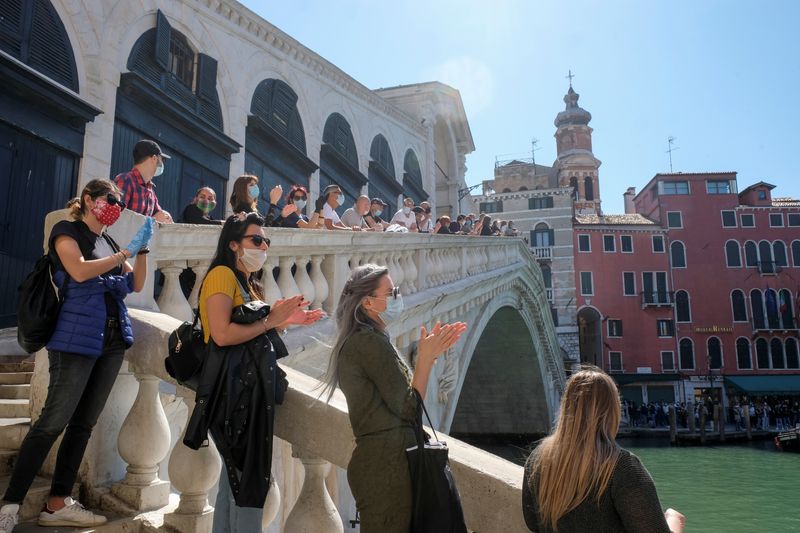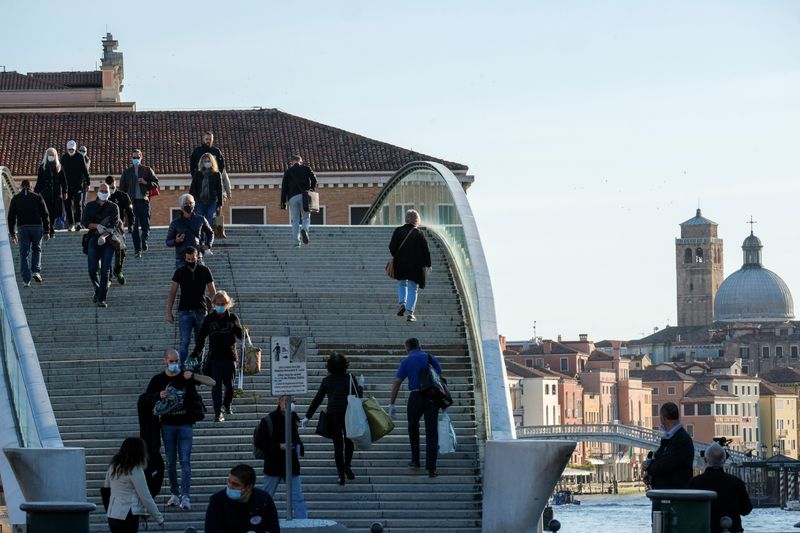By Crispian Balmer and Susan Heavey
ROME/WASHINGTON (Reuters) - Italy and the United States were among a slew of countries easing lockdown restrictions on Monday to resurrect economies, but officials cautioned against moving too swiftly as global deaths from the coronavirus neared a quarter of a million.
Italy, among the world's hardest-hit countries, started to relax the longest lockdown in Europe, allowing about 4.5 million people to return to work after nearly two months at home. Construction work can resume and relatives can reunite.
"I woke up at 5.30 a.m. I was so excited," said Maria Antonietta Galluzzo, a grandmother taking her three-year-old grandson for a walk in Rome's Villa Borghese park, the first time they had seen each other in eight weeks.
In the United States, where there have been the most infections and deaths globally, Ohio and other states prepared to ease more curbs on businesses on Monday.
About half of states partially reopened economies over the weekend, in what has become a highly charged political issue, as President Donald Trump warned the national death toll - now at almost 68,000 - could rise as high as 100,000.
"We can't stay closed as a country," Trump said on Fox News. "We're not gonna have a country left."
Spain, Portugal, Nigeria, India, Malaysia, Israel and Lebanon were also among countries lifting some restrictions, variously reopening factories, construction sites, parks, hairdressers and libraries.
The easing comes as the daily rate of new COVID-19 cases worldwide has been sitting in a 2%-3% range over the past week, down from a peak of around 13% in mid-March.
Global cases have risen to around 3.52 million, according to a Reuters tally based on government data. However, cases may cause only mild symptoms and not everyone with symptoms is tested, while most countries only record hospital deaths.
"We still have to be sceptical about the numbers we get," said Peter Collignon, an infectious diseases physician and microbiologist at Canberra Hospital. "We could easily have a second or a third wave because a lot of places aren't immune."
'IGNITE AT ANY TIME'
Scott Gottlieb, a former U.S. Food and Drug Administration commissioner said the United States was seeing a "mixed bag" of results from virus mitigation efforts. He said about 20 states had experienced a rising number of new cases.
"We expected that we would start seeing more significant declines in new cases and deaths," he told CBS's "Face the Nation" on Sunday. "If we don't snuff this out more and you have this slow burn of infection, it can ignite at any time."
Italian Prime Minister Giuseppe Conte said his country, where the novel coronavirus has killed almost 29,000 people and over a thousand new cases are reported daily, was still in the "full throes of the pandemic".
Friends are still barred from meeting up in Italy, most shops must stay shut until May 18, and schools, cinemas and theatres remain closed indefinitely.
"It is good to be back, but the world has totally changed," said Gianluca Martucci, pulling up the shutters on the small warehouse of a catering business in the backstreets of Rome.
"I worry that we might be starting up a little too soon ... I don't know if the country could survive a second wave."
Hairdressers, ironmongers and other shops tentatively opened as Spain too began a multi-phase plan to reopen. Red Cross workers handed out masks at Madrid metro stations, now mandatory on pubic transport.
Similar phased steps were taken in other countries, from Portugal and Belgium to India and Israel.
MASK, GLOVES, DISTANCE
People around the world are adjusting to a new normal.
A hum of cars, buses and motorbikes pointed to an increase in morning commuting in Rome, but traffic was lighter than before the virus and those out appeared to be following the guidelines on social distancing.
In Ohio, where construction and manufacturing are allowed to reopen and office staff return, workers must wear face coverings and stay at least six feet apart.
In Beirut, restaurants began to reopen but were removing chairs and tables in compliance with government rules that they do not fill beyond 30% of their capacity.
"It's very good for the staff to start to get motivated again, to come back to work, and for the economy to start moving," said Ralph Malak, a bar owner.
Iran, which has reported more than 6,000 deaths, was due to reopen mosques in 132 cities. Worshippers must maintain social distancing, wear masks and gloves and not stay for more than half an hour, the ISNA news agency reported.
WAR OF WORDS ON VIRUS
While stringent measures to curb the outbreak have often been broadly backed by the public, governments are counting the economic cost.
Factory activity was ravaged across the world in April, business surveys showed, and the outlook looked bleak as shutdowns froze global production and hammered demand. The global economy is expected to suffer its steepest contraction on record this year.
Escalating tensions between the United States and China over the origin of the pandemic drove down stock markets and oil prices on Monday as investors feared a new trade war.
U.S. Secretary of State Mike Pompeo said on Sunday there was "a significant amount of evidence" that the virus emerged from a laboratory in the Chinese city of Wuhan. He did not provide evidence or dispute an earlier U.S. intelligence conclusion that the virus was not man-made.

An editorial in China's Global Times, run by the ruling Communist Party's official People's Daily, said he was "bluffing" and called on Washington to present its evidence.
